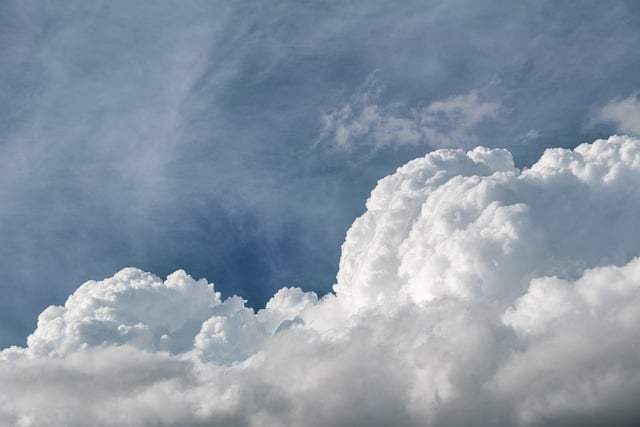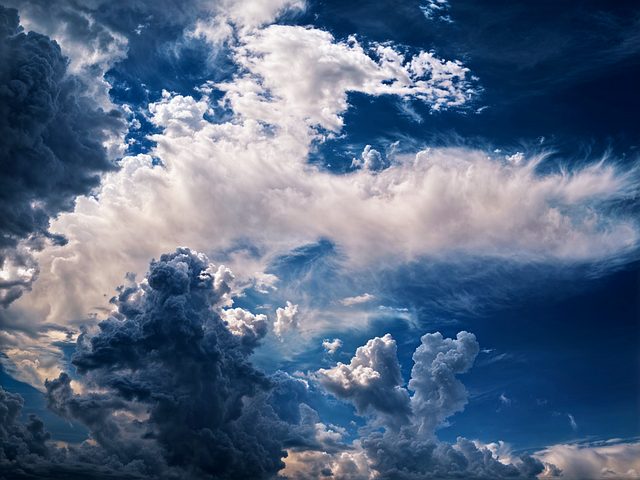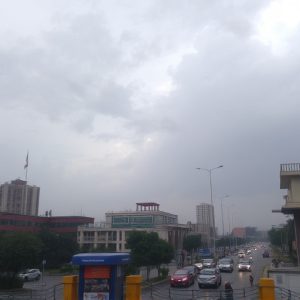Karachi’s Climate Outlook: Temperatures, Alerts, Patterns, Air Quality, and Safety Tips
Currently, Karachi is experiencing warm temperatures around 30 degrees Celsius with clear skies and…….

Currently, Karachi is experiencing warm temperatures around 30 degrees Celsius with clear skies and comfortable winds. Over the next week, temperatures are expected to rise slightly, reaching up to 32 degrees and dipping to 26 degrees under mostly sunny conditions, with occasional light breezes to enhance outdoor comfort. Residents are advised to stay hydrated and use sun protection while outdoors. In contrast, as the monsoon season approaches, there is a risk of monsoon rains, strong winds, and high tides which could lead to waterlogging, traffic disruptions, and sea intrusion in low-lying coastal areas. The local government and emergency services are prepared to manage these weather events effectively, urging citizens to heed official updates and safety advisories. Karachi's climate is marked by wet and dry seasons with high temperatures, particularly between May and July, and monsoon rains that can cause flooding. Future climate projections suggest more intense heatwaves and potentially longer hot seasons, along with changes in monsoon patterns, necessitating preparedness for the effects of climate change. Air pollution remains a concern, with frequent high readings on the AQI due to vehicular and industrial emissions, leading to health risks, especially for those with respiratory issues. The city is addressing this by implementing stricter emission standards and promoting clean energy technologies. Lastly, residents are encouraged to prepare for extreme weather conditions by staying informed, maintaining emergency kits, identifying evacuation routes, and ensuring personal safety, while also planning for community support and infrastructure resilience to effectively manage any severe weather events in Karachi.
Discover the dynamic weather patterns of Karachi with our comprehensive article, providing up-to-the-minute temperature readings and forecasts. Stay informed with the latest weather advisories and alerts for residents, ensuring safety and preparedness during any unusual conditions. Delve into historical weather trends and expert predictions to understand Karachi’s climate better. Assess current air quality index (AQI) reports to monitor pollution levels, crucial for maintaining health and well-being. Our article serves as a vital resource for staying ahead of the weather curve in this vibrant city.
- Current Temperature and Forecast for Karachi
- Weather Advisories and Alerts Issued for Karachi Residents
- Historical Weather Patterns and Predictions for Karachi
- Air Quality Index (AQI) and Pollution Levels in Karachi
- Preparedness and Safety Measures During Unusual Weather Conditions
Current Temperature and Forecast for Karachi

As of the latest update, Karachi’s current temperature is a comfortable 30 degrees Celsius, with mild winds providing a pleasant respite from the heat. The city is experiencing clear skies, which are expected to persist over the next few days. Looking ahead, the forecast for Karachi suggests that the coming week will see temperatures fluctuating slightly, with daytime highs reaching up to 32 degrees Celsius and dropping to a low of 26 degrees Celsius at night. These conditions are anticipated to be stable, with only minimal variations expected due to prevailing weather patterns. Residents can expect mostly sunny days with the occasional light breeze, making it an ideal time for outdoor activities. It’s always advisable to stay hydrated and protected from the sun during daylight hours.
Weather Advisories and Alerts Issued for Karachi Residents

Residents of Karachi are advised to stay vigilant as the meteorological department has issued weather advisories and alerts for the region. These advisories outline potential changes in atmospheric conditions, including monsoon rainfall, strong winds, and high tides that may affect low-lying areas. The department emphasizes the importance of preparing for heavy rains that could lead to waterlogging and traffic disruptions. Flood warnings are particularly relevant for coastal areas, where the risk of sea intrusion is heightened during these weather events. The local government and emergency services have been put on high alert, ready to respond to any weather-related incidents. Citizens are urged to follow the advisories closely, keep updated through official channels, and take necessary precautions to ensure their safety and minimize potential disruptions to daily life. It is crucial to monitor the latest updates and heed any instructions provided by local authorities for timely and effective weather management.
Historical Weather Patterns and Predictions for Karachi

Karachi, Pakistan’s largest city, is situated on the Arabian Sea coast and exhibits a distinct tropical climate with distinct wet and dry seasons. Historically, the region experiences high temperatures throughout the year, with the hottest months being May through July. The summer season typically brings scorching heat, often exceeding 38 degrees Celsius. Monsoon rains arrive in June or July, providing much-needed relief and replenishing the city’s water sources. These rains are sometimes intense, leading to flooding in low-lying areas.
Looking ahead, meteorological predictions suggest that Karachi’s weather patterns may be influenced by broader climate shifts associated with global warming. The city is projected to experience more frequent and severe heatwaves, which could extend the duration of the hot season. Additionally, changes in monsoon behavior could alter rainfall patterns, potentially affecting agriculture, infrastructure, and the overall livability of the region. It is imperative for local authorities and residents to adapt to these shifts, considering both the immediate implications for daily life and long-term strategies to mitigate the impacts of climate change on Karachi’s weather system.
Air Quality Index (AQI) and Pollution Levels in Karachi

Air quality in Karachi has been a consistent concern for residents and environmentalists alike. The Air Quality Index (AQI), a standardized indicator that measures air pollution levels, often reflects high values in the city, particularly during certain seasons when industrial activities peak and the monsoon winds subside. These elevated AQI levels are primarily due to emissions from vehicles, factories, and waste burning, contributing to a mix of particulate matter (PM2.5 and PM10) and gaseous pollutants such as nitrogen dioxide (NO2), sulfur dioxide (SO2), and carbon monoxide (CO). The presence of these pollutants can exacerbate respiratory issues and have detrimental effects on public health, prompting the need for stringent environmental policies and sustainable practices to mitigate air pollution. Efforts to improve the situation include the enforcement of emission standards for vehicles, waste management reforms, and the promotion of clean energy solutions to reduce the overall impact on Karachi’s atmosphere. Monitoring stations across the city provide real-time data that can guide both immediate health advisories and long-term planning strategies to address the quality of air in Karachi.
Preparedness and Safety Measures During Unusual Weather Conditions

In the event of unusual weather conditions, Karachi residents must adopt a proactive stance on preparedness and safety measures. This includes staying informed about weather forecasts through reliable sources such as meteorological departments or trusted news platforms. It is advisable to have an emergency kit ready with essential supplies like water, non-perishable food, first aid kits, batteries, and flashlights. Individuals should also be aware of the nearest shelters and have a plan in place for evacuation if necessary. During heavy rains or flooding, avoid low-lying areas and be wary of landslides in hilly regions. Power outages are common during such events, thus having alternative communication means like a hand-cranked radio can be beneficial. For those with medical conditions or mobility issues, prior planning and community support systems are crucial to ensure their safety.
Furthermore, communities should work together to enhance safety measures. This involves clear communication channels among neighbors for timely alerts and assistance. Local authorities play a vital role in maintaining infrastructure robust enough to withstand extreme weather conditions and in prompt disaster response. Public spaces should be designed with resilience in mind, incorporating drainage systems that mitigate the risk of waterlogging. Education on weather-related risks and safety practices is essential for all members of society, particularly children, who should be taught what to do in case of emergencies. By combining individual preparedness with collective community efforts, Karachi can better navigate and recover from unusual weather conditions.
Residents of Karachi can stay informed with the latest weather updates available on Yahoo, providing essential details on current temperatures and forecasts. It is crucial to heed any advisories and alerts for timely preparation against potential weather-related challenges. Understanding historical patterns and predictions aids in anticipating future conditions, while monitoring the Air Quality Index underscores the importance of environmental health. Preparedness and safety measures are vital during unusual weather events to ensure community wellbeing. Stay updated to navigate Karachi’s ever-changing climate responsibly.


